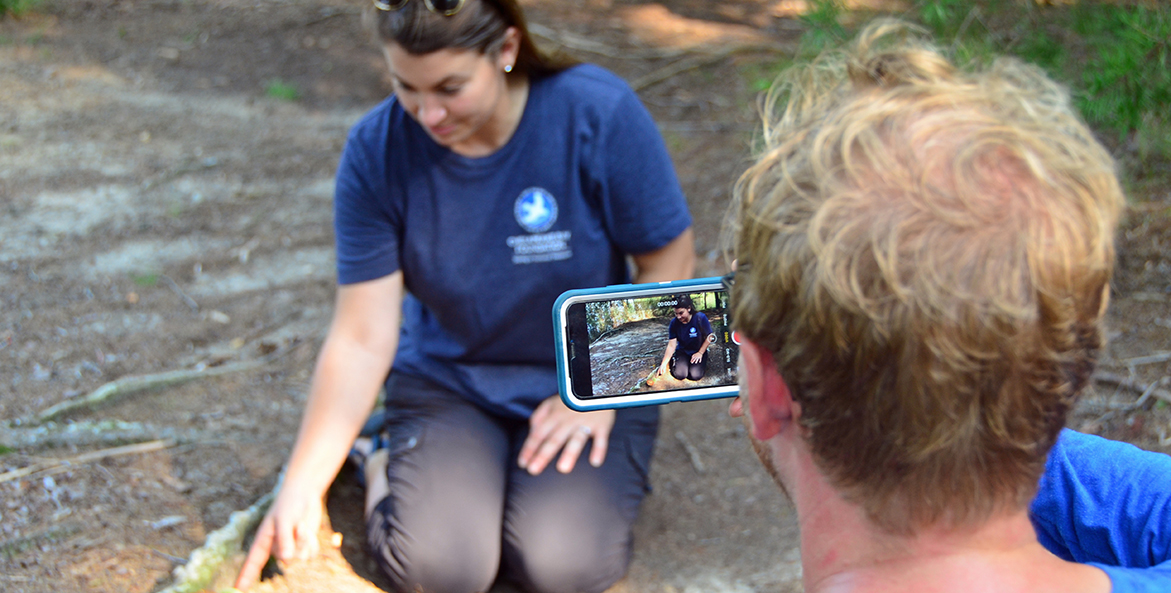September is here! Normally that would mean back-to-school shopping for new binders and backpacks, but as you know, this year is very different. Just as parents and educators have had to switch up their back-to-school planning, our education team is doing the same.
I sat down with three CBF educators, Pennsylvania Student Action and Restoration Program Educator Liz Yocom, Merrill Center Program Manager Kellie Fiala, and Merrill Center Assistant Manager Kris Belessis, to ask them about our new virtual learning program and what they’re excited for in the coming months.
What is the new Chesapeake Bay Foundation Online Watershed Learning (OWL) program, and how does it work?
Kris: Like our field programs, CBF OWL gives students the opportunity to learn more about the Bay watershed with CBF educators.
Liz: It’s a series of lessons that investigate key concepts of watershed education.
Kellie: The lessons were thoughtfully designed to support curriculum standards and engage students throughout the watershed. The CBF OWL program will connect CBF educators online with teachers and students to provide engaging, relevant, and informative lessons.
Liz: Prior to a session, the teacher will receive resources that the students can explore independently. During the session, the CBF educators will provide an interactive presentation that builds on those pre-experience materials. After the lesson, we’ll leave educators and students with post-experience materials that provide more resources and opportunities to extend their learning on the given topic.
The mission of CBF’s Education Program is to create a constituency who will value the Bay and its watershed as a living, connected system and who will act to restore clean water and ensure a high quality of life for all inhabitants. How does CBF OWL help CBF continue this work when field experiences are temporarily on hold?
Kellie: We have always emphasized the importance of hands-on and experiential learning in our field programs. While we won't be physically leading students into a marsh, helping them paddle a canoe, or passing out binoculars on the boat, we still plan to engage students in a way that’s similar to how we interact in the field. This new program will allow us to, quite literally, meet students where they are, which allows us to use local experience and knowledge as connections to their own environment.
Kris: Through our online program we can continue to educate students about the health of the Bay and how we as a community of the watershed can take action to save it. As an educator, I hope that our CBF OWL program will allow me to share my passion for teaching and inspire others to want to learn more about their local watershed.
Liz: This new online program allows us to meet students where they are and bring the Bay and local waterways into their homes or classrooms the best we can through a virtual experience. With post-experience resources we hope to encourage students to take their learning beyond the classroom and apply their Bay and watershed knowledge to their own backyards and communities.
What type of information will you be covering through the CBF OWL program?
Kris: The program is broken up into six themes—Chesapeake Bay Ecosystem, Forest Wetlands and Healthy Water, Oysters in a Clear Bay, Freshwater Ecosystems, Watershed Connections, and State of the Bay. We’ll be covering a lot of information! One thing that all our lessons have in common is a focus on real-world learning. We want students to be empowered to analyze and make decisions that impact their environment.
What are you most excited for with this new program?
Liz: I am most excited about the opportunity to meet students where they are and to help guide those connections between their own backyard and their local waterways. I get excited about empowering students to want to make positive changes in their communities by helping them have a greater understanding of natural systems and how everything is connected.
Kellie: While the pandemic has brought a lot of pain into our lives, it has also shed light on many important issues in our country. Just one of those systemic issues is lack of access to things like equal environmental learning opportunities and outdoor space based on one's geographic area. During my time at CBF, we have been working toward providing educational opportunities to all inhabitants of the watershed. I am excited that the structure of this new program will allow us to cast a wider net and reach new audiences while we foster strong connections, both new and old.
Kris: I’m excited to teach a wider audience of students. By joining classes online, it removes most of the hardships that teachers face when organizing field experiences. I’m excited to meet new faces and to help pave a new avenue for students to become connected with the Bay and their local waters.
If you could leave the students with one key take away, what would it be?
Kellie: Be curious and never stop asking questions. (Sorry parents, guardians, and teachers!)
Kris: As members of the Bay watershed, we are all naturally connected. I want students to understand this relationship and find ways to connect with their community and their local environment. It is my hope that by developing this connection, they will also foster their own reasons to want to save the Bay.
Liz: You can make a difference. Saving the Bay, saving your local waterway, starts in your own backyard.
How can educators and parents learn more and sign up for a CBF OWL experience?
Liz: Educators and parents can learn more and make a reservation by visiting cbf.org/owl. If you have any questions, you can reach our education coordinator team at [email protected] or 1-800-445-5572.




